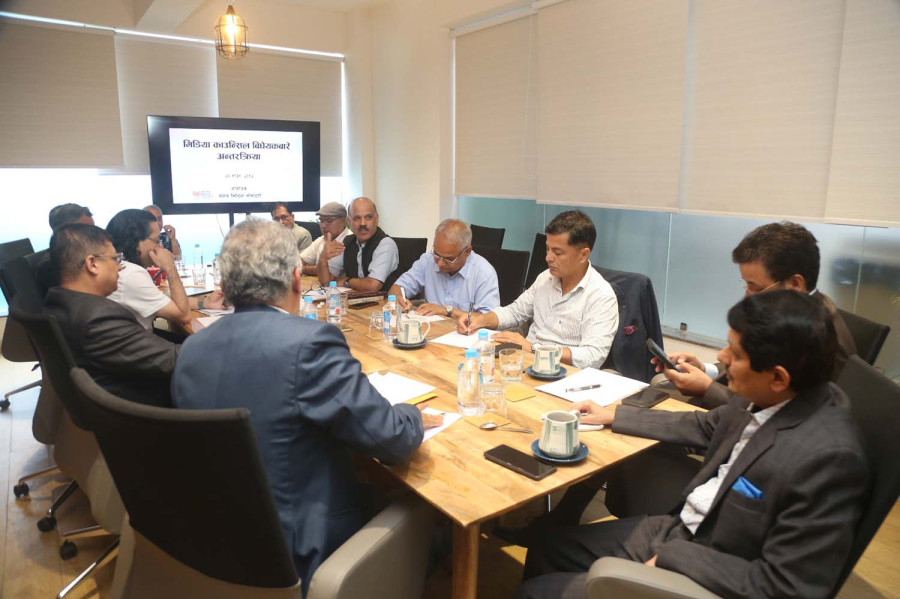National
Amendment to media law raises a host of questions
Experts criticise government move to bring online registration process under the home ministry’s purview.
Post Report
A recent, quietly executed amendment to Nepal’s Printing and Publication Act has stirred significant debate in the country’s media sector.
The move, made without the knowledge of Minister for Communication and Information Technology Prithvi Subba Gurung, transfers the authority to register and renew online media outlets from the Department of Information to district authorities—a shift causing confusion and concern among media professionals.
On July 30, the Nepal Gazette published amendments to 76 laws, including the pivotal Printing and Publication Act, which became known to officials only on Tuesday.
“This provision in the law was changed without the notice of our ministry, and we are unaware where this amendment proposal came from,” said Minkumar Sharma, acting director of the Information Department.
The amended Article 20(2) of the Printing and Publication Act now requires individuals looking to operate online media to apply to the Chief District Officer concerned.
After due inquiry, the district administration may grant registration if deemed suitable.
However, Sharma pointed out ambiguity in the clause. Although the law mandates registration with a lower federal authority, it vaguely notes that “other provisions relating to the registration, operation, and renewal of online media shall be as prescribed,” with specifics awaited in detailed regulations.
Sharma confirmed that the department continued registering online media until Tuesday, ceasing only after being notified of the new legal provision.
After the notice, “we stopped registering them on Wednesday”.
On the other hand, the district administration offices have not started registering online media, citing the lack of regulations.
An officer at the Kathmandu District Administration Office said they have received no directions from the home ministry about the registration.
What concerns stakeholders most is that neither the department nor Minister Gurung was consulted ahead of the amendment.
On Tuesday, a group of CPN-UML-affiliated journalists met Minister for Communication and Information Technology Gurung, to voice their concern over the amended clause.
According to Ganesh Pandey, who led the UML-affiliated journalists at the meeting, Minister Gurung expressed ignorance of the process that had begun before he came into office more than a year ago. It was routed through the home and law ministers before being taken to Parliament without his oversight.
The lack of transparency and coordination has fuelled discontent in the media fraternity. Media persons say that the government should ensure consistency by either removing the annual renewal requirement or equally applying standards to newspapers and online media.
The amendment mandates that the online media’s registration should be renewed. However, media stakeholders say that once a newspaper is registered with the district authority, it need not be repeated.
Stakeholders are also concerned why online media are brought under the home ministry’s district office while there are a number of offices under the information and communication ministry.
When the district authorities are given discretion on whether to renew an online [medium], they might act on their vested interest or by the government’s order, stakeholders claimed.
This uncertainty has confused owners and self-employed journalists, who wonder how the transition will occur and whether renewal—previously centrally managed—will become more burdensome at the district level.
Baburam Aryal, a media advocate, said the full implications of this amendment remain unclear and will likely hinge on the formal regulations yet to be issued. For Aryal, bringing the online media under the purview of the district administration is a bad practice.
“While discussion continues on a comprehensive Media Council Bill, this latest development has heightened concerns over governmental transparency and the future operating environment for Nepal’s media,” Aryal said. “These legal shifts could derail the discussions on the broader Media Council Bill.”
Earlier, there was no specific law for online media registration. It was done under the Good Governance directives. That the government has ensured the law is commendable, said Taranath Dahal, another media advocate.
“But, when the constitution itself gives the authority to regulate the media to the provinces, this amended law brings online media under the home ministry’s watch. This is not good,” Dahal said.
Meanwhile, the Nepal Media Society on Wednesday held an interaction with top officials from the media organisations and experts on the Media Council Bill, which is being discussed in the federal parliament.
“During the interaction, experts, editors and media owners expressed their serious concern over the Media Council Bill that aims to control the media rather than work for the betterment, upliftment and regulation of the media.”
The participants stressed that the bill must not be endorsed in its present form, the society said in a statement.




 10.12°C Kathmandu
10.12°C Kathmandu














